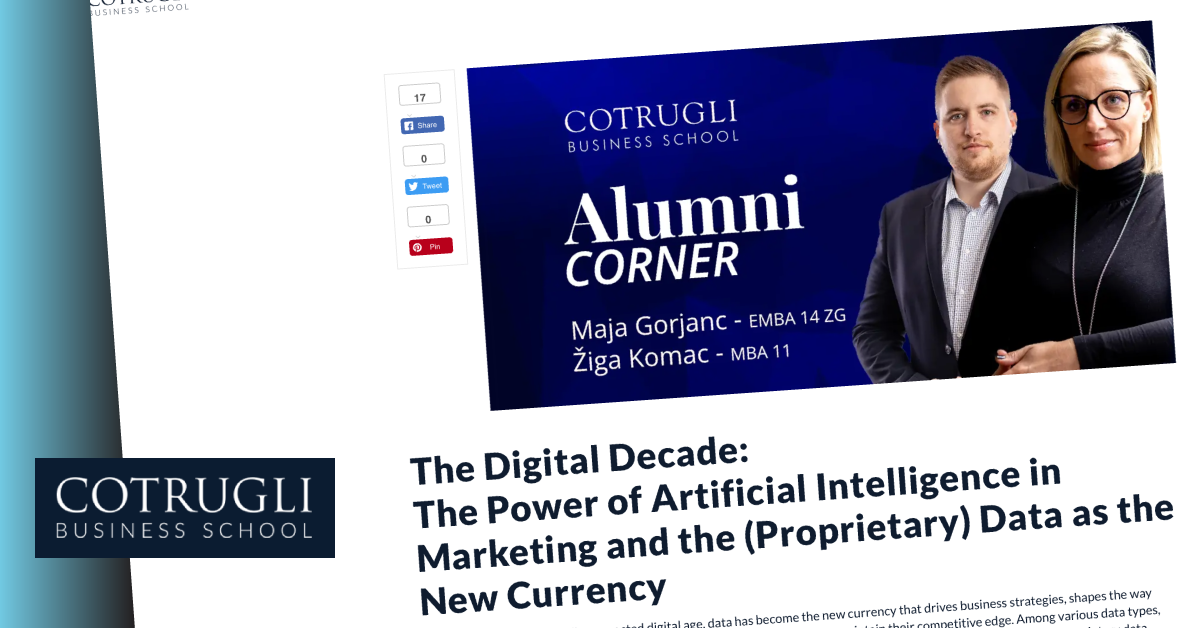In the article for Cotrugli Business School, Maja Gorjanc, Marketing Partner at iPROM, and Žiga Komac, CRO at iPROM, focused on marketing and advertising and highlighted why it is important for companies to invest in building their own data warehouses today.

In today’s fast-paced and fully connected digital age, data has become the new currency that drives business strategies, shapes the way organizations communicate with their customers, and enables companies to maintain their competitive edge. Among various data types, proprietary, first-party data has been the most frequently mentioned in marketing recently. When properly stored in proprietary data warehouses, it is considered a valuable resource that companies can use to gain a competitive advantage. Combined with state-of-the-art artificial intelligence (AI) capabilities, companies can use their own data to gain deeper insights into their customers, make better-informed decisions, and deliver personalized experiences, along with targeted marketing and personalized advertising. All this leads to better productivity and ROI.
Key takeaways:
- Data is the new currency: In the digital age, data has become a valuable asset that drives business strategies and competitiveness. Proprietary, first-party data collected directly from customers is highly valuable for personalized marketing.
- AI empowers marketing: By analyzing and extracting insights from large datasets, Artificial Intelligence (AI) facilitates behavioral analysis, predictive analytics, and personalized content, improving marketing effectiveness and customer experiences.
- Benefits of first-party data: First-party data allows companies to deliver personalized customer experiences, target marketing efforts more accurately, and build trust with customers through transparent data collection practices.
- Challenges from big tech: Tech giants like Alphabet, Meta, and Amazon dominate digital advertising, limiting advertisers’ access to audience data and insights on campaign effectiveness.
- Invest in a private data lake: To regain control and effectively target audiences it is crucial to invest in a private advertising data lake that utilizes first-party data. This approach leads to higher ROI and a competitive advantage in the long term.
Types of Data That Can Be Used By Companies for Marketing Activities
Let’s start with first-party data collected directly by a business through its own media, such as its website, apps, and other digital touchpoints with customers. This data is typically collected using cookies, log files, and other tracking technologies and often serves to personalize the user experience, track user behavior, and improve the effectiveness of marketing campaigns. Second-party data is data collected by one company and shared with another company, often in the form of a partnership or collaboration. This data is usually collected in the same way as first-party data and is often used to supplement the company’s own data and provide additional insights and targeting opportunities. Third-party data is data collected by a company other than the one using it. In advertising, this data is often gained through the use of cookies and tracking technologies on third-party websites. It is then used to target advertisements and track user behavior across various websites. These types of data differ significantly in ownership, quality, and level of control.
Understanding the Value and True Meaning of First-party Data
There are several benefits to the use of first-party data for marketing purposes and experienced marketers and data scientists undoubtedly know how to use it effectively. To gain a better understanding, let’s delve into the most important advantages to consider for enhancing marketing strategies.
Personalization and customer experience
- : First-party data is vital to delivering personalized customer experiences. By analyzing customer behavior, purchase history, and interactions, companies can tailor their offerings to meet individual preferences, resulting in greater customer satisfaction and loyalty.
Improved targeting and marketing effectiveness: Understanding customer demographics, interests, and pain points drives more precise targeting in marketing campaigns. This targeting approach not only increases the effectiveness of marketing efforts but also reduces the waste of advertising resources on irrelevant audiences.
The role of AI in analyzing first-party data: The sheer volume and complexity of first-party data make it challenging to extract meaningful insights manually. This is where artificial intelligence-powered tools and platforms come in. AI algorithms can efficiently process large datasets, identify patterns, and extract actionable insights in real-time.
Behavioral analysis: AI can analyze customer behavior at different digital touchpoints, such as websites, mobile apps, online stores, etc. This valuable analysis helps companies gain insights into how customers interact with their brand, identify key touchpoints, and optimize the customer experience.
Predictive analytics: AI can accurately predict future customer behavior based on historical data. By analyzing past interactions and purchase patterns, companies can anticipate customer needs, identify potential churn, and take proactive measures to retain customers.
Building trust and transparency: Customers are increasingly aware of data privacy and security. The use of first-party data builds trust because it comes from a direct relationship between the customer and the brand. Transparency about data collection practices and responsible use of data strengthens the bond between brand and customer.
The Value of First-party Data Management Platforms for Customer-Centric Marketing
Since the digital media space is becoming increasingly competitive with the rise of new technologies, especially artificial intelligence tools, it has become harder for advertisers to make sense of it all. Tech giants such as Alphabet, Meta, and Amazon have created a virtual monopoly on advertising investment in the US market – according to some sources, they account for more than 70% of all digital advertising investment. However, limited insight into audience data makes precise control over the effectiveness of their campaigns simply impossible, leaving advertisers in a quandary.
If you are aware of the threat of triopoly and are looking for a way to take back control of your data and effectively target your audiences, then we advise you to start actively considering your own private advertising data lake as soon as possible. It will provide you with the tools you need to build your audience base and different segments using first-party data. This can provide you with a significantly higher return on advertising investment and a greater competitive advantage in the long term.
A privately owned advertising data lake allows companies to harness the power of first-party data using independent advertising technology. Advertisers can use it to create their own personal walled garden and directly target their desired or potential customers. They allow advertisers to free themselves from third-party data to reach their audience, which often comes at a cost and can be expensive.
A solution such as iPROM Private DMP allows you to effectively manage and leverage first-party data, making it an indispensable tool for businesses looking to succeed in this digital decade where data is increasingly replacing oil as the most valuable resource. With the power of AI and their own data, businesses can chart a path to success and growth in the dynamic world of modern business. Imagine being able to effectively address a predefined audience according to their interests and improve the effectiveness of advertising campaigns by using the perfect message at the right moment. This is exactly what Fraport Slovenia, the operator of Aerodrom Ljubljana, is able to do using their private data lake. Find out how in this video.
This article was originally published on the Cotrugli website with the title: The Digital Decade: The Power of Artificial Intelligence in Marketing and the (Proprietary) Data as the New Currency.
